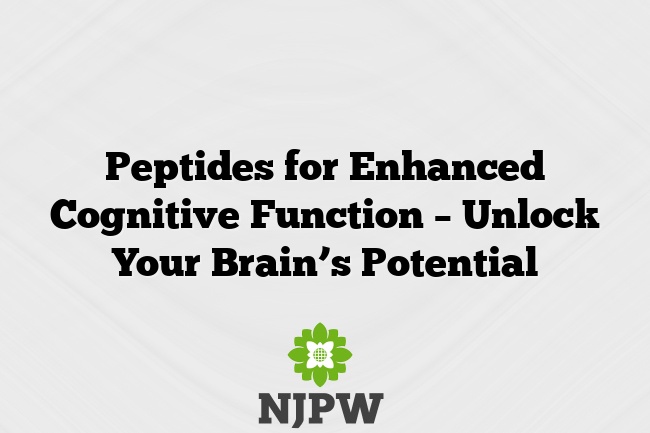Peptides for Enhanced Cognitive Function – Unlock Your Brain’s Potential

Unlocking the Cognitive Potential: Exploring the Remarkable Benefits of Peptides
Peptides have emerged as a remarkable tool in the realm of cognitive enhancement, offering a unique and promising approach to unlocking the brain’s full potential. These tiny molecular structures, composed of amino acid chains, have demonstrated the ability to significantly improve various aspects of brain function, from memory and focus to neuroprotection and neuroplasticity.
| Key Peptide Benefits | Description |
|---|---|
| Memory Enhancement | Certain peptides have been shown to enhance the formation and retention of memories, improving overall cognitive performance. |
| Neuroprotection | Peptides can help protect the brain from the damaging effects of oxidative stress, inflammation, and neurodegenerative processes. |
| Neuroplasticity | By stimulating the brain’s ability to adapt and change, peptides can support the development of new neural pathways and improve cognitive flexibility. |
As we delve deeper into the world of peptides and their impact on cognitive function, it becomes clear that these remarkable molecules hold the key to unlocking the brain’s true potential.
What are Peptides?
Peptides are small chains of amino acids that play a crucial role in various biological processes throughout the body, including the brain. Unlike their larger counterparts, proteins, peptides are typically composed of fewer than 50 amino acids, making them more easily absorbed and utilized by the body. These compact structures possess the ability to interact with specific receptors and trigger targeted physiological responses, making them highly effective in the realm of cognitive enhancement.
The ghrelin receptor, for instance, is a key target for certain peptides that have been shown to improve memory, focus, and overall brain function. By binding to this receptor, these peptides can stimulate the release of neurotransmitters like dopamine and acetylcholine, which are essential for cognitive processes.
Furthermore, peptides can also influence the protein synthesis pathways within the brain, promoting the growth and repair of neural connections. This process, known as neurogenesis, is crucial for maintaining cognitive flexibility and adaptability as we age.
The Role of Peptides in Cognitive Enhancement
The remarkable potential of peptides in cognitive enhancement lies in their ability to target and modulate various aspects of brain function. From improving memory and focus to supporting neuroprotection and neuroplasticity, these tiny molecules have demonstrated their ability to unlock the brain’s full potential.
One of the primary ways in which peptides enhance cognitive function is through their neuroprotective properties. Many peptides have been shown to possess antioxidant and anti-inflammatory properties, helping to shield the brain from the damaging effects of oxidative stress and neuroinflammation. This protection can help preserve the integrity of neural pathways and support the long-term health of the brain.
In addition to their neuroprotective effects, peptides can also stimulate neurogenesis, the process of creating new brain cells and neural connections. This process, known as neuroplasticity, is crucial for maintaining cognitive flexibility and adaptability throughout our lives. By promoting the growth and development of new neural networks, peptides can help the brain adapt to new challenges and improve overall cognitive performance.
Key Peptides for Improved Brain Function
While there are numerous peptides with potential cognitive-enhancing properties, a few stand out as particularly promising in the realm of brain health and cognitive function.
MK-677, also known as ibutamoren, is a peptide that has been shown to stimulate the release of growth hormone and insulin-like growth factor 1 (IGF-1), both of which play critical roles in brain function and neurogenesis. This peptide has demonstrated the ability to improve memory, focus, and overall cognitive performance in both animal studies and human clinical trials.
Semax is another peptide that has garnered significant attention for its neuroprotective and cognitive-enhancing effects. This peptide has been found to improve attention, memory, and executive function by modulating the activity of key neurotransmitters like norepinephrine and dopamine.
The thymosin beta-4 peptide has also been the subject of extensive research for its potential in supporting brain health and cognitive function. This peptide has been shown to promote the growth and repair of neural connections, as well as to possess anti-inflammatory and antioxidant properties that can protect the brain from age-related decline.
Mechanisms of Action: How Peptides Enhance Cognition
Peptides exert their cognitive-enhancing effects through a variety of mechanisms, each of which contributes to the overall improvement of brain function.
One of the primary ways in which peptides enhance cognition is by modulating the activity of neurotransmitters, the chemical messengers that facilitate communication between neurons. Certain peptides, such as Semax, have been shown to increase the levels of neurotransmitters like norepinephrine and dopamine, which are essential for attention, focus, and memory formation.
Peptides can also stimulate the growth and repair of neural connections, a process known as neuroplasticity. By promoting the formation of new neural pathways and strengthening existing ones, peptides can enhance the brain’s ability to adapt and learn, leading to improved cognitive performance.
Additionally, many peptides possess neuroprotective properties, shielding the brain from the damaging effects of oxidative stress, inflammation, and neurodegenerative processes. This protection can help preserve the integrity of neural networks and support long-term cognitive health.
Unlocking the Brain’s Potential with Peptide Supplementation
The incorporation of peptide supplements into a comprehensive cognitive enhancement regimen can unlock the brain’s true potential, leading to significant improvements in various cognitive domains.
By targeting the underlying mechanisms that govern brain function, peptides can help enhance memory formation and recall, improve focus and concentration, and support overall cognitive flexibility. This can be particularly beneficial for individuals seeking to optimize their mental performance, whether in academic, professional, or personal pursuits.
Moreover, the neuroprotective properties of peptides can help safeguard the brain against age-related cognitive decline, potentially delaying the onset of neurodegenerative conditions like Alzheimer’s disease and Parkinson’s disease. This makes peptide supplementation a promising strategy for maintaining cognitive health and resilience as we grow older.
Benefits of Using Peptides for Cognitive Enhancement
The use of peptides for cognitive enhancement offers a multitude of benefits that can positively impact an individual’s overall brain health and performance.
One of the primary advantages of peptides is their ability to improve memory and enhance learning. By modulating neurotransmitter levels and promoting neuroplasticity, peptides can help individuals better retain information, recall memories, and acquire new skills more efficiently.
In addition to memory and learning enhancements, peptides have also been shown to boost focus and concentration. This can be particularly beneficial for individuals who struggle with attention-related challenges or who need to maintain high levels of focus for extended periods, such as students, professionals, or athletes.
Furthermore, the neuroprotective properties of peptides can help safeguard the brain against cognitive decline and support long-term brain health. By mitigating the effects of oxidative stress and inflammation, peptides can contribute to the preservation of neural integrity and the prevention of age-related neurodegenerative conditions.
Selecting the Right Peptides for Your Needs
When it comes to incorporating peptides into a cognitive enhancement regimen, it’s essential to carefully select the appropriate peptides based on your specific needs and goals.
For individuals seeking to improve memory and learning, peptides like MK-677 and Semax may be particularly beneficial, as they have demonstrated the ability to enhance the formation and retention of memories.
Those looking to boost focus and concentration may find success with peptides like thymosin beta-4, which have been shown to modulate neurotransmitter activity and support cognitive flexibility.
For individuals aiming to maintain long-term brain health and prevent cognitive decline, peptides with neuroprotective properties, such as Semax and thymosin beta-4, may be the ideal choice.
Optimizing Peptide Dosage and Timing
Achieving the desired cognitive benefits from peptide supplementation requires careful consideration of dosage and timing. The optimal dosage and administration schedule can vary depending on the specific peptide, the individual’s needs, and other factors.
It’s generally recommended to start with the lowest effective dose and gradually increase it as needed, closely monitoring the individual’s response. This approach helps to minimize the risk of potential side effects and ensures that the peptide is used in a safe and effective manner.
The timing of peptide administration is also crucial, as certain peptides may be more effective when taken at specific times of the day. For example, some peptides may work best when taken in the morning to support cognitive function throughout the day, while others may be more beneficial when taken before a demanding cognitive task or workout.
It’s important to consult with a healthcare professional or a knowledgeable provider to develop a personalized peptide supplementation plan that takes into account your individual needs, goals, and any other relevant factors.
Combining Peptides with Other Nootropics
While peptides can be highly effective on their own, combining them with other nootropics can amplify their cognitive-enhancing benefits and create a synergistic effect.
For instance, pairing MK-677 with racetams, a class of nootropics known for their ability to improve memory and focus, can lead to enhanced cognitive performance. The combination of these compounds can help to boost neuroplasticity and support the overall health and function of the brain.
Similarly, thymosin beta-4 can be combined with antioxidants and anti-inflammatory agents to further protect the brain from the damaging effects of oxidative stress and inflammation. This comprehensive approach can help to maintain long-term cognitive resilience and prevent age-related cognitive decline.
When exploring the use of peptides in combination with other nootropics, it’s essential to consult with a healthcare professional to ensure the safety and efficacy of the chosen supplements and to develop a personalized regimen that addresses your specific needs and goals.
Safety Considerations and Potential Side Effects
While peptides are generally well-tolerated and considered safe for cognitive enhancement, it’s important to be aware of potential side effects and to take appropriate precautions.
Some common side effects associated with peptide use may include mild gastrointestinal discomfort, headaches, or fatigue. These side effects are typically mild and tend to subside as the body adjusts to the peptide supplementation.
It’s crucial to start with the lowest effective dose and gradually increase it as needed, as higher doses may increase the risk of side effects. Additionally, individuals with pre-existing medical conditions or those taking certain medications should consult with a healthcare professional before incorporating peptides into their regimen.
Proper storage and handling of peptides is also essential, as they can be sensitive to factors like temperature, light, and humidity. Following the manufacturer’s instructions and storing the peptides in a cool, dry place can help ensure their potency and effectiveness.
Conclusion
The remarkable potential of peptides in the realm of cognitive enhancement is undeniable. These tiny molecular structures have demonstrated the ability to improve memory, boost focus and concentration, and support long-term brain health through a variety of mechanisms. By unlocking the brain’s true potential, peptides offer a promising solution for individuals seeking to optimize their cognitive performance and maintain cognitive resilience throughout their lives.
Frequently Asked Questions
What are the key benefits of using peptides for cognitive enhancement?
Peptides offer a range of benefits for cognitive enhancement, including improved memory and learning, enhanced focus and concentration, and neuroprotective effects that can help safeguard the brain against age-related cognitive decline.
How do I select the right peptides for my specific cognitive needs?
When choosing peptides for cognitive enhancement, it’s important to consider your individual goals and needs. Peptides like MK-677, Semax, and thymosin beta-4 have demonstrated different cognitive-enhancing properties, so it’s crucial to consult with a healthcare professional to develop a personalized supplementation plan.
Are there any safety concerns or potential side effects associated with peptide use?
While peptides are generally well-tolerated, it’s important to be aware of potential side effects, such as mild gastrointestinal discomfort or headaches. Starting with the lowest effective dose and gradually increasing as needed, as well as proper storage and handling, can help minimize the risk of side effects.






